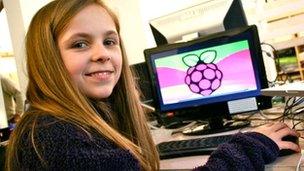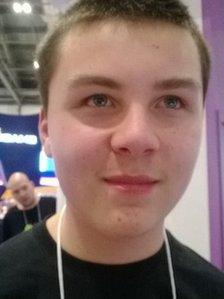Teenage computer coders on the rise
- Published

Amy Mather encourages other children to code
The world's biggest learning technology show has opened in London, with Education Secretary Michael Gove promising a more ambitious computer science curriculum in schools in England. He says pupils as young as five will learn to code and program - but many children already do.
Amy Mather's first taste of coding was at a science festival, when she was 11.
Now 14, she designs games, writes her own software and was named the European Digital Girl of the Year in 2013.
She even speaks at industry events, to encourage other children to give it a try.
"Everyone has ideas how to make our lives easier," she says.
"Coding gives you the power to do that. The sky's the limit."
Amy, from Manchester, is not surprised by the growing popularity of coding: "Everyone has a smartphone, and we all use computers".
Callum Easton, 14, was at the London show with a group from his school in Portland, Dorset.
His father, an engineer, gave him his first taste of coding when he was barely old enough to go to school.
"There are people who think computers are not that cool, but they are," he says.
"And the government is taking more and more notice of how coding can earn the country money."
Someone very aware of the growing interest in coding among teenagers is Steven Flower.
He set up a group for young coders in Manchester in 2009. About eight turned up - all of them boys.
Now he's expecting 150 teenagers next month at his Manchester Coder Dojo, external. It will be a full house, and it is free.

Callum Easton was five when he began coding
Many bring their own laptop, or their Raspberry Pi - a relatively simple computer for coding. And the parents who used to drop off their kids, and come back later, now often stay to see what is going on.
"The average age is about 10-and-a-half, but we have six-year-olds coming along," he says.
Plenty of those who turn up are girls - but they are still outnumbered by boys by a ratio of 60:40.
"Coding gets more attention now because it's cooler," Steven says.
And he acknowledges the occasional story of someone selling their app for big money plays a part.
"But overwhelmingly, people are here for the social element," he says. "They get to learning something interesting - and it's fun."
For Amy Mather, the stereotypical image of a teenager coder sitting in a darkened bedroom has been consigned to history.
"Of course I call myself a geek," she says. "But look it up in the dictionary - it means someone who's an enthusiast."
She is, and she is far from alone.
- Published8 October 2013
- Published13 November 2013